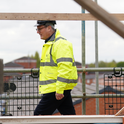Leaking roofs, damp walls and dodgy electrics—it’s a familiar story for thousands who rent privately and can often feel like an endless cycle. Poorly-maintained housing matched by poor landlords is a toxic combination for renters, who not only have limited rights but often are faced with no other option than to stick it out for fear of eviction. The private rented sector is becoming increasingly precarious with many people teetering on the edge of homelessness.
As a child, my family experienced homelessness, and so I know all too well the anxiety and stress this brings. This experience has been a driving force behind our campaign for better housing in Lewisham.
Like the rest of London, in Lewisham, we face an acute housing crisis. We have 2000 people living in temporary accommodation and 600 sleeping in bed and breakfasts every night.
With many people only one paycheque away from falling into debt and subsequently missing a rent payment, private renting is the leading cause of homelessness.
Private renting now represents 25 per cent of the total stock in Lewisham—that’s 32,000 properties across the borough, an increase from 12 per cent in 2001.
The private rented sector is a key part of housing provision and we want to work with landlords to ensure homes are of good quality, and tenants have a good standard of living. We want to license all private rented houses in an effort of making private renting in Lewisham better for everyone. Everyone deserves a decent and secure home.
From our own research, we know that 21 per cent of the private rent households are deemed unsuitable for living. Turning a blind eye is not an option.
Following extensive research into the sector and consultation with residents, we will shortly be applying to the Secretary of State for Housing for approval of a borough-wide licensing which will apply to all private rented properties in Lewisham. By setting out what is expected of landlords the scheme will reduce poor housing and offer protection for tenants who have very few rights.
The system will work by landlords paying up to £750 for a licence which will last five years and will mean that they are their properties are subject to legal checks with penalties of up to £30,000 if they don’t comply.
For most millennials in their 20s and 30s, who are far less likely to access socially rented homes, the possibility of owning a home feels like a distant dream. We are failing the younger generation if we do not at the very least offer them secure housing.
Bringing in a borough-wide licensing scheme will empower the council to crack down on rogue landlords and will insist that all privately rented properties are held to a much higher standard.
In the capital, it is predicted that 40 per cent of households will be renting privately by 2025.
The private rented sector is a vital source of housing for so many and owning a home is now it of reach for too many that we have to act now.
This isn’t about pitting ‘good’ landlords against ‘bad’ landlords. The scheme will set a standard which will mean that only good landlords will be allowed a license. It will be easier to identify rogue landlords who don’t comply, helping to root them out and send a clear message about what is expected.
Living in a safe and good quality home should not be exclusive to those that can afford to buy their own homes. We have to do better than this.
The case for a landlord licence
Everyone deserves a decent and secure home. A landlord licencing scheme will reduce poor housing—and offer vital protections for tenants
October 14, 2019

Housing developments behind a leisure centre on Lewisham. Photo: Flickr/Matt Brown, used under Creative Commons 2.0











